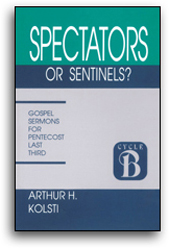SermonStudio
Living Between Beginnings
Sermon
SPECTATORS OR SENTINELS?
Sermons For Pentecost (Last Third)
The 13th chapter of Mark's gospel is positioned by him to serve as the last discourse of Jesus with his disciples. Through the artistry of the evangelist the words of Jesus become the words of the living Jesus spoken to the church in history. Two grand imperatives surface, "beware!" and "watch!" These commands are set within the perspective of the ongoing Divine purpose that transcends the present shadows and turbulence of history, the myriad occasions for fear, and the constant reminders of our vulnerability in a disaster-prone world.


